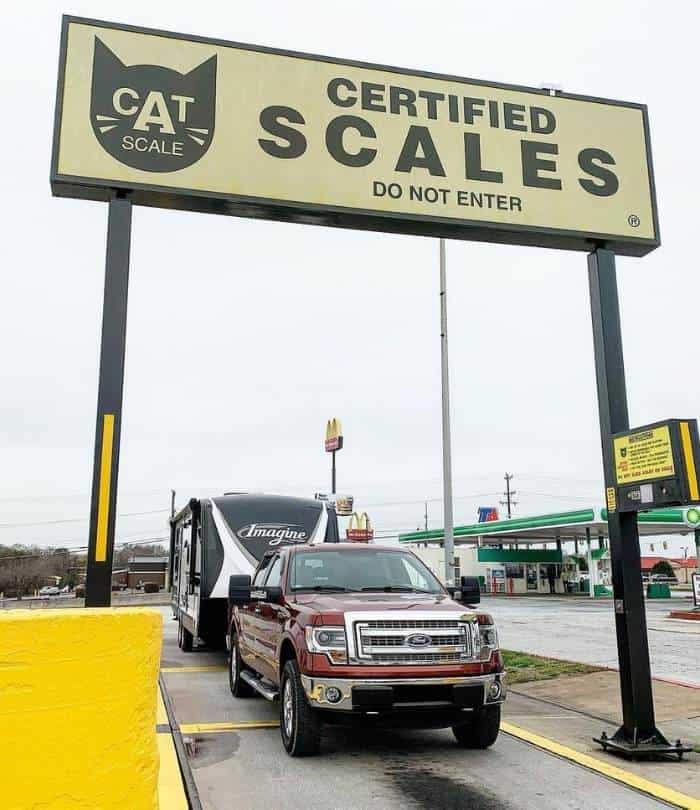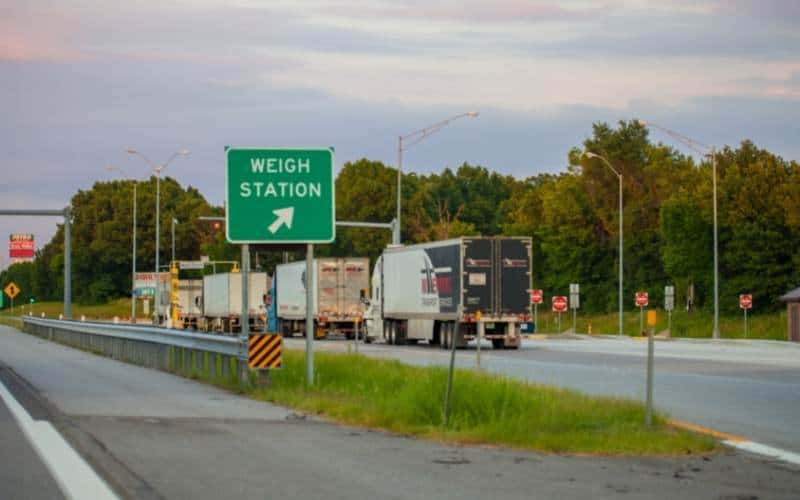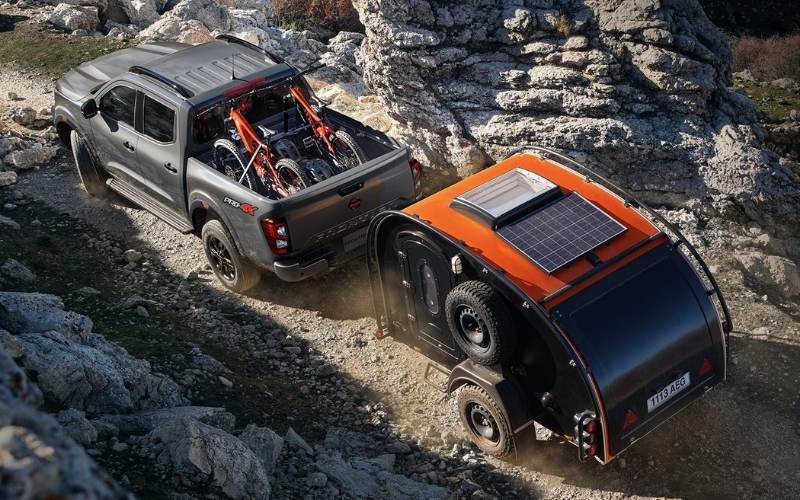One of the great things about traveling in an RV is that anyone can do so with nothing more than a standard driver’s license.
You can bring all of the comforts of home without any required classes or credentials, and you have the leisure of traveling according to your own pace and price range.
But with no formal training on how to operate an RV, you may encounter some new questions, such as, do RVs have to stop at weight stations? After all, you are driving a small house on wheels down the freeway.
In most circumstances, RVs are not required to stop at weigh stations. Weigh stations are primarily concerned with the weight and safety of business cargo trucks, not private-use vehicles. However, each state has its rules, and certain larger motorhomes, fifth wheels, or travel trailers weighing over 10,000 pounds may be required to make the stop.
We’ve put together this guide on RV weigh station rules and vehicle weight to help you determine if your RV has to stop at weigh stations.
The Purpose of Weigh Stations
Vehicles continually wear on the roads they drive on, and road repairs are an inevitable part of street traffic.
These repairs can be costly, so weigh stations were put in place to collect taxes to fund them.
The original idea was that, because larger and heavier vehicles put a significantly higher amount of stress on roads than personal vehicles, they would get taxed according to their weight to help fix the damages they bring about.
While these taxes are primarily required from commercial fleets, certain states will want them from any vehicle over a certain weight.
Weigh stations are also concerned with ensuring safety. One of the ways in which they do this is by making sure that the roads can support the traffic traveling on them.
Because some roads and bridges can only support a limited amount of weight, confirming that the vehicles driving on them are below the weight capacity is important for the safety of drivers as well as the structural preservation of the roads themselves.
Weigh stations also ensure that fleet drivers, some of whom may be traveling for multiple days on end as they cross the country, are safe to be on the road.
Doing so keeps companies compliant with required resting times for drivers as well as cargo load capacities.
How to Determine if Your RV is Required to Stop at Weigh Stations?
Now that you understand the purpose of weigh stations, it’s time to figure out if your RV is required to make the stop. What classifies a vehicle as “large”, and how do you know if your vehicle’s weight is under the limit?
In general, if you’re driving a large motorhome or pulling a travel trailer or fifth wheel that have a GVWR 10,000 pounds or more you need to stop at a weigh station in 20 out of 50 states.
To determine If your RV is overweight or nor, first need to know the weight of your vehicle, followed by the specific laws of each state that you plan to travel through.
How Do I Figure Out My RV’s Weight?
The weight of your RV, along with all other necessary stats, can be found in several locations, including:
Wherever you attain the information, you will find several different weight ratings.
Understanding what each means will help you determine the approximate weight of your RV at the time of travel.
Gross Vehicle Weight (GVW)
The Gross Vehicle Weight, or GVW, is the weight that weigh stations would be concerned with is the actual weight of your vehicle, including any cargo and people that are traveling in it.
Although the exact gross vehicle weight of your RV may be difficult to determine without an actual scale, there are several other weight indicators that can give you a ballpark idea of where your vehicle stands.
If you are towing a trailer rather than driving an RV, you’ll be concerned with the Gross Trailer Weight, or GTW.
This weight will take a bit more effort to determine, as the weight includes the weight of the trailer or fifth wheel, as well as the weight of the vehicle towing it.
Both vehicles will have their own weight ratings, and adding the two together will give you an approximate idea of your GTW.
Gross Vehicle Weight Rating (GVWR)
The Gross Vehicle Weight Rating, or GVWR, tells you the maximum capacity that your RV is recommended to carry.
This is a good number by which to begin gauging the weight of your RV.
If the GVWR of your vehicle is less than the weight at which vehicles must stop at weight stations AND you are only carrying standard cargo that’s not exceptionally heavy, then you won’t have to worry about weigh stations.
However, if your GVWR is higher than or in the close range of weigh station requirements, you may have to take a few more factors into account to determine the GVW of your RV.
Dry Weight/ Unloaded Vehicle Weight (UVW)
The dry weight, also referred to as the unloaded vehicle weight (UVW) of your vehicle is its weight with all of the standard features and equipment, but without any
The dry weight provides a foundational number to build from in order to determine your GVW.
However, there are several variations in how the dry weight of a vehicle is determined that could affect the GVW, so check with your vehicle’s manufacturer for specifics.
The following are some common variations to calculating dry weight:
Any of these variations can significantly increase the weight of your vehicle, so be sure to get the details on exactly how your RV’s manufacturer calculated the weight for the most accurate estimate.
Calculating the weight of your RV is the first step in figuring out if you are required to stop at weigh stations.
The next thing you’ll need to know is each state’s specific rules regarding weigh stations.
Although the rules are not clear-cut in every state, we’ve broken it down so that you know when you’re in the clear, and when you may have to make a stop.
What States Require RVs To Stop At Weigh Stations?
When it comes to driving a motorhome or pulling a fifth wheel or travel trailer, it all depends on the GVW.
Weigh stations are primarily concerned with commercial vehicles, and RV’s are not required to stop at them in 30 out of the 50 states unless trailer exceed or have a GVWR of more than specific limits.
The other 20 states base whether or not any vehicle or needs to stop on weight, which is why it’s important to know approximately where your vehicle stands before traveling through these areas.
Here is a breakdown of basic RV weigh station rules by state:
Stops Required for Vehicles Above a Set Weight Limit
Some states require vehicles over a certain weight to stop at weigh stations. If your RV or or vehicle combination greater than that amount, a stop at the weigh station is necessary.
Although certain states specifically exclude RV’s, most states with a set weight limit do not specify the type of vehicle, which is why it’s important to know your vehicle’s approximate GVW as you travel.
States that require any RV or RV and vehicle combination over 10,000 lbs. to stop include:
Several other states have similar requirements, but only for vehicle or vehicle combination over 26,000 lbs., including:
Although these lists provide a guideline as to which states may require you to stop, some specify agricultural vehicles and trucks, while most don’t provide further details around whether or not personal RVs are included.
Furthermore, Pennsylvania takes these vague rules to another level by requiring that “large” recreational vehicles make a stop, but failing to specify what defines a “large” vehicle.
When in doubt, there are several ways to get some clarification. One way is to call a state DMV.
With a description of your vehicle and its approximate weight, they should be able to tell you if you need to stop at a weigh station.
Another way is to simply stop at an open weigh station.
The attendant will be one of the most informed people on the matter and will either be able to help you with the process, or, more than likely, send you on your way with your worries eased.
When the rules are as murky as they are surrounding weigh stations, experience is also sometimes the best indicator.
when driving a motorhome or towing an RV because it is not “commercial.”
Most RV forums agree that driving a motorhome or towing an travel trailer or fifth wheel are generally exempt, so we think that, so long as there are no clear indicators for you to stop, it is generally okay for you to bypass weigh stations and get on with your road trip.
Stops Required at Police Discretion
There are a number of states that allow cops to reroute any vehicle to a weigh station. States that allow this include:
Being asked to pull into a weigh station can happen for a number of reasons and is no call for alarm.
People travel across the country in RVs and trailers of all sizes on a regular basis, and as long as you are properly operating your vehicle with standard cargo, the stop should be quick and uncomplicated.
Reducing the Weight of Your Vehicle To Avoid Weighing Stations
If you want to reduce the GVW of your RV, there are several ways to lighten the load.
One of the easiest ways to reduce weight is to empty out any unnecessary liquids.
Empty your gray and black holding tanks before traveling or at the nearest rest stop, and don’t fill your fresh water holding tank if you will be parking at a facility with water hook-ups.
You can also reduce weight by being conscious about what you bring with you. Items like canned goods, glass bottles and jars, and bulk beverages like soda or beer can all add a significant amount of weight to your RV.
Also consider any large or heavy recreational items, heavy dishware, and any other unnecessary items you could leave behind.
How to Avoid Stopping at Weigh Stations
Although most RV vacationers don’t have to be concerned with stopping, there are several ways to avoid the process all together.
Here are 3 ways to avoid stopping with your RV in tow:
What Happens if You Should Have Stopped at a Weigh Station, but Didn’t?
The laws around weigh stations for RVs are pretty murky, so don’t fret too much if you think you should have stopped, but missed it. There are no legal repercussions, and there it is unlikely there will be any repercussions at all.
If for some reason it was necessary for you to stop, it’s possible that you will be redirected back to the weigh station by an officer.
The worst-case scenario could leave you with a fine, but this is highly unlikely in most situations.
Can I Use Weigh Stations to Weigh My RV?
Yes, you can pull into a weigh station and request to weigh your RV, though it may cost you a small fee to do so. Certified Automated Truck (CAT) scales large platform scales that will tell you exactly what the GVW of your RV is so that you know where you stand in regards to each state’s rules.
However, you may also want to know the weight of your RV to understand the wear and tear it will have on the tires.

When weighing your RV for the maintenance of the vehicle, wheel positioning weighing is recommended over a platform scale.
If the weight of your RV is not evenly distributed, it can put more strain on some tires than others. This can lead to more frequent repairs, more money spent, and even the risk of a tire blowout.
Wheel positioning weighing is only available at RV weigh stations. It uses a scale under each tire, in turn providing you with the specific weight that each tire bares.
This allows you to see how the weight in your RV is distributed, so that you can remain safe on the road and avoid unnecessary expenses.
The Heaviest RVs on the Market
RVs come in all shapes and sizes, from pop-up campers to luxurious motor coaches and buses. Although many standard RVs weight in below any weight limits, some of the larger options can be quite heavy.
The Jayco Pinnacle earned the title of largest and heaviest tow trailer anyone can legally haul. With a UVW of 13,805 and the need for a large and heavy vehicle to tow it, this fifth wheel may be subject to stopping at weigh stations in states with a 10,000 lb. limit.
For Class C motorhomes, the Winnebago Boldt 70KL takes the win as heaviest RV. Although Class C RVs are generally smaller than Class A motorhomes, this RV offers many of the same amenities in a compact shell, bringing its GVWR to 11,030 lbs.
Although both of the above RVs are the heaviest in their categories, the heaviest RV on the market is bound to be a class A motorhome.
With a GVWR at a whopping 63,600 lbs., the Newell Coach 2020p is currently the heaviest RV on the market. You’ll be living large in this RV, which carries features and appliances such as:
You’ll be traveling like royalty in this RV. Of course, when you wish to include all of the luxuries of a brick-and-mortar home in an RV, the same rules don’t necessarily apply.
With a GVW of over 60,000 lbs. it would be a good idea to confirm the rules of weight stations in each state you travel through.
A Bit of Common Sense and Research Go A Long Way
Traveling in an RV can put us in some unique situations that force us to use common sense and to think on our toes.
While it is important to be well informed about your vehicle and your routes, it is also often best to learn as you go. Ask questions, learn when you make mistakes, and take it all in as a growing process.
With very few clear-cut rules regarding weigh stations and RVs, we recommend to use these same skills to make the best judgement for your situation.
While most RV forums will tell you that RVs are hardly ever required to stop at weigh stations, anyone traveling in vehicle that is considerably larger or more equipped than others may consider going straight to the source for answers by calling a local DMV, or by simply stopping at a weigh station and inquiring.
At the end of the day, RV travel is meant to be fun. Although weigh stations play an important role in road safety, they should certainly not be the source of any worry or concern as you explore the country.







1 Comment
Kevin M
8 months agoThere are no permanent weigh stations in Massachusetts which makes me wonder how well this article was researched. Troopers escort suspected overweight vehicles to ten (10) designated paved locations off the main roadway in order to safely inspect and weigh (with portable scales) vehicles.
As a retired commercial motor vehicle inspector and CDL driver, and having traveled through many of the 20 “exception” states listed in the article in my Class A diesel pusher towing a Jeep, I can tell you I have never pulled into a weigh station nor have I ever been cited for not doing so.
Weigh stations are concerned with overweight commercial vehicles and commercial vehicle safety regulations.